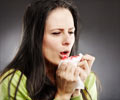A joint University of Melbourne and Royal Children's Hospital study from Australia has found that over 40 per cent of parents have used cough medicine for children younger than two,
Almost 40 percent of parents have used cough medicine for children younger than two, despite numerous warnings issued on such products, University of Melbourne and Royal Children's Hospital study from Australia have found..
For the study, the researchers surveyed 325 parents at hospital outpatient clinics, maternal child health centres and child care centres about their use of over-the-counter medication for children aged 0-24 months.It is the first study in Australia examining the use of over-the-counter medications among parents of children in this age group.
University of Melbourne Nursing PhD researcher Misel Trajanovska found that 98 per cent had purchased an over-the-counter medication in the past year; Paracetamol was the most commonly used drug (95.9 per cent); 47.3 per cent had given their children topical teething gels; and almost half (42.8 per cent) had given their children cough and cold medicines containing anti-histamines.
The researchers also discovered that nearly all parents had used over the counter medications to combat pain and fever; about seven per cent of parents had given their child over-the-counter medication to induce sleep or settle their child; and two parents had given their children paracetamol because they were "cranky".
Trajanovska said the use of cough and cold medicines on children under two was of particular concern.
"Internationally there have been a number of reports of serious side effects among infants and children given over-the-counter cough medicines,'' she said.
Advertisement
"The Therapeutic Goods Administration recommends that these medicines should not be used on children under two, and from September they will only be available to children under two on prescription," she added.
Advertisement
"Despite the widespread use of over-the-counter medicines for young children, they are not without risks such as side effects or poisoning," she said.
Trajanovska will present data from her study at the National Medicines Symposium 2008 in Canberra.
Source-ANI
RAS/L









